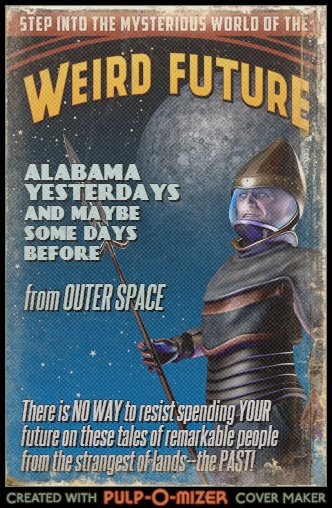The live action Batman TV series ran for 120 episodes in the swinging sixties, from January 12, 1966 until March 14, 1968. The campy take on the legendary character was so popular ABC broadcast episodes two nights a week during the first two seasons. The series also spawned the first full-length feature film with Batman, released in 1966.
A prominent aspect of the show featured recurring villains played by well-known actors of the day who joined in the fun. Cesar Romero played The Joker, Burgess Meredith The Penguin and Frank Gorshin and John Astin both played The Riddler. Julie Newmar and Eartha Kitt starred as Catwoman. Less well-known villains were acted by George Sanders, Vincent Price, Cliff Robertson, Milton Berle, Anne Baxter and Carolyn Jones among others.
Alabama's own Tallulah Bankhead appeared in two episodes in season two, "Black Widow Strikes Again" on March 15, 1967, and "Caught in the Spider's Den" the following night. I've done several blog posts on Bankhead and will no doubt do others in the future. I wrote about her 1932 film with Robert Montgomery, Faithless and her 1944 film Lifeboat. She made two appearances, sort of, on Lucille Ball comedy shows. I've also written about a 2018 visit to the Jasper home of her father, William Bankhead. You can find my brief biography of her in that Lucille Ball post.
Well, just how did Miss Tallulah Bankhead get on this show, anyway? Joel Lobenthal in his 2004 biography Tallulah!: The Life and Times of a Leading Lady tells the tale. One of her lifelong friends was actress Estelle Winwood, and she told Tallulah what a good time she'd had during her appearances. Bankhead made a late night call to executive producer William Dozier and told him she "must" be on the program. Production staff member Robert Mintz wrote two scripts about a new villain created just for her. The Black Widow had taken up a life of crime after the death of her husband, Max Black. In the show her partners call her "Blackie" or "BW". Batman declares she is "sophisticated but evil."
By the time these episodes were broadcast, Tallulah was less than two years away from her death on December 12, 1968. Her health problems had limited her acting in the 1960's. Her last appearance on Broadway came in a revised version of Tennessee Williams' The Milk Train Doesn't Stop Here Anymore which ran briefly in January 1964. Williams' had written the play for her and loosely based the character Flora Goforth on her.
Bankhead made her last trip to Hollywood from her home in New York City in December 1967 to appear on the Smothers Brothers Comedy Hour. She appeared on The Tonight Show with Johnny Carson one final time on May 14, 1968. Joe Garagiola was guest hosting; John Lennon and Paul McCartney, and pie-in-the face comedian Soupy Sales were also guests.
I recently watched these two Batman episodes, and in this blog post and a second one I'll be discussing them. See further comments below. The show certainly wasn't high art, but these episodes with Bankhead were fun to watch.
Alabama has had at least two other "spider" women, Carol Foreman & Marie Hilley. Alabama native and actress Forman played the lead in The Black Widow, a 1947 film serial from Republic Studios. Hilley was a real-life Alabama serial killer often called "The Black Widow".
As our story opens, Black Widow arrives at a bank in the sidecar of a motorcycle driven by one of her underlings.
In the bank president's office she turns on the charm.
Black Widow used hypnosis, drugs, and other methods to control victims. In this first episode she uses a machine to short-circuit brain waves and make the victim obey her commands.
Soon she is leaving the bank with a big bag of money.
In her lair, the Black Widow and her henchmen admire the money.
Soon she is arriving at another bank. Here, before she can take possession of the money, Batman and Robin show up. Police Commissioner Gordon has asked for thei help in catching her.
Blackie whips out another of her weapons, the Instant Nerve Paralyzer ad zaps Batman with it. She doesn't even bother with little Robin.
With Batman under control, the Black Widow can toy with Robin.
Black Widow and her driver return to the lair, which is underneath a suburban home.
On her periscope she watches the arrival of Batman and Robin after the nerve paralyzer has worn off.
Black Widow soon has the Dynamic Duo in her web, literally, and questions arise when she unleashes her real giant spiders.
Well, as they say, "Tune in tomorrow night...."
These are the actors who played Black Widow's partners in crime. Donald Barry acted in a number of western TV shows as well as other programs and films. Al Ferrara has only a few credits in the IMDB in addition to these episodes. Michael Lane had a number of roles in films and television between 1956 and 1994 including Hondo, Gunsmoke, Kojak, and Mission Impossible.
Actor George Raft makes a brief, uncredited appearance near the end of this episode. In November 1933 Bankhead had a five-hour radical hysterectomy at a Los Angeles Hospital. The operation, which almost killed her, was done to treat an advanced case of gonorrhea. According to Lobenthal's biography, she later told a confidante that Raft had given the disease to her. The two actors don't have a scene together, but the juxtaposition seems odd. Were such uncredited appearances common on the show, or did Tallulah have something to do with it in this episode?










































